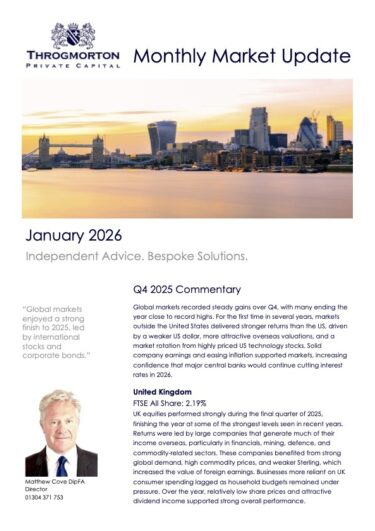Our monthly market update.

Global markets recorded steady gains over Q4, with many ending the year close to record highs. For the first time in several years, markets outside the United States delivered stronger returns than the US, driven by a weaker US dollar, more attractive overseas valuations, and a market rotation from highly priced US technology stocks. Solid company earnings and easing inflation supported markets, increasing confidence that major central banks would continue cutting interest rates in 2026.
November was a more unsettled month for markets as investors grew more cautious.
Global markets made steady progress in October, with most major regions delivering positive returns. Technology companies continued to lead the way, supported by strong earnings and ongoing interest in AI. Government bond prices also rose as investors became more confident that central banks are moving closer to lowering interest rates. The US government shutdown and renewed trade tensions caused some short-term disruption, but these concerns eased later in the month. Overall, the global backdrop remained supportive, and most asset classes benefited from improving confidence and more stable economic conditions.
Global markets delivered positive gains in Q3 2025, supported by robust demand for AI and technology, resilient corporate earnings, and a well-anticipated interest rate cut from the US Federal Reserve. Commodities also performed well, with gold and silver reaching record highs, while a weaker US dollar provided additional support for emerging markets. Bonds were broadly supported by improved liquidity and investor appetite for income, although performance varied across regions. Overall, market strength was widespread, with most major regions producing positive returns over the quarter.
Global equity markets advanced in August, supported by easing inflationary pressures, resilient corporate earnings, and increased expectations of interest rate reductions from major central banks. Developed markets outperformed their emerging market counterparts over the month, while fixed income markets were mixed, with performance varying across regions.
Markets delivered positive returns in July, with trade tensions easing and company results reassuring investors. The US and Japan led gains due to strong performances in technology and export-driven sectors. Europe and the UK also advanced on solid corporate earnings, while emerging markets benefited from optimism around AI, particularly in Taiwan and Korea. However, India and Brazil struggled under the weight of new US tariffs.
The quarter was characterised by a rise in geopolitical tensions due to the threat of US tariffs and further hostilities in the Middle East, the latter of which de-escalated relatively quickly. The initial recession fears around the “Liberation Day” tariff announcements in the US eased as a more conciliatory approach was ultimately taken. Despite President Trump unveiling higher than anticipated broad-based tariffs, these were generally suspended for 90 days to allow for trade negotiations to take place.
